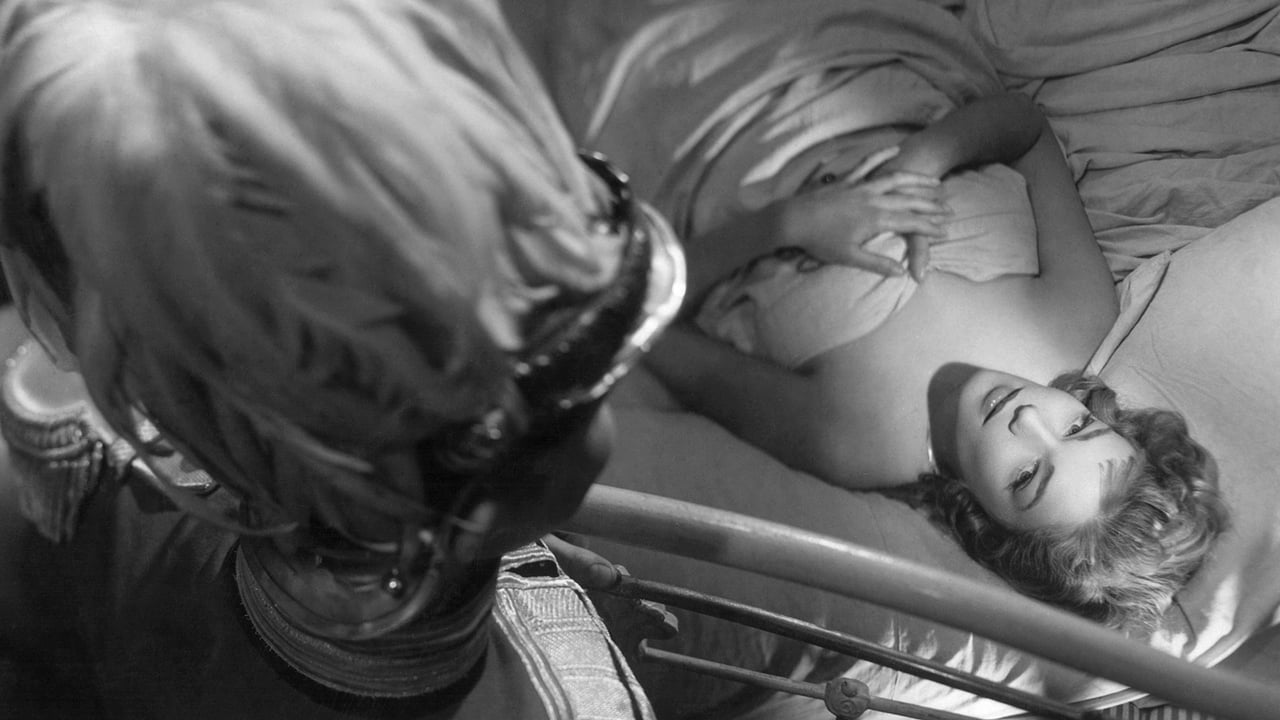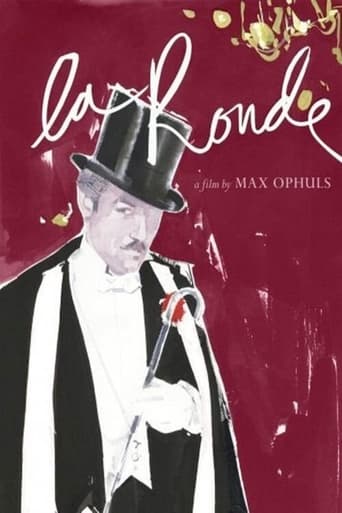

It is a whirlwind of delight --- attractive actors, stunning couture, spectacular sets and outrageous parties.
... View MoreAfter playing with our expectations, this turns out to be a very different sort of film.
... View MoreI enjoyed watching this film and would recommend other to give it a try , (as I am) but this movie, although enjoyable to watch due to the better than average acting fails to add anything new to its storyline that is all too familiar to these types of movies.
... View MoreThere's no way I can possibly love it entirely but I just think its ridiculously bad, but enjoyable at the same time.
... View MoreThe film is paced well - not too fast, nor too slow - and is paired with a nice waltzy ballad, sung here by the ever brilliant Anton Walbrook.It is sometimes difficult to relate to the characters in this film; one questions whether such casual infidelities and flings were as common - as they are portrayed here - back in 1800s Vienna. Perhaps among aristocrats and the military. Less so the middle-class and less so Austria in this present century... When preparing to watch this film, the viewer must not expect a serious or bleak tale about dysfunctional relationships. For this one is an airy, flowing, winking ode to love in its many forms (if one can call it love), lost in its own romance....When I was watching 'La ronde', i was thinking how exciting it would have been if this story of interconnected tales of love included a man with a philandering wife who himself is in love with another man... Surely if the 1950s audience could view a film depicting polyamory in positive light, they should be cool with homosexuality (on a side note, 'Les enfants terribles' released the same year makes clear the male hero's love for another man). Perhaps it is my 21st century mind that makes me notice the heteronormativity of this film. Or how about, if the story includes a person seducing another person but the recipient does not respond to it, and instead gets together with somebody else, thus continuing the 'love circle'?And also i thought the film would come to a neat conclusion with the last 'lover' finally putting an end to this circle by settling down and committing to another, by marrying him/her and saying those vows while MEANING it. But maybe such an ending would have gone against Max Ophuls' message that the ring of various loves is never ending, and instead goes on and on until death....
... View MoreMy very first Ophüls film, a breezy studio-bound adaption of Arthur Schnitzler's play "Reigen", set in the 1980s in Vienna (yes, I'm freshly returning from a one-week vacation in Vienna). Structurally, LA RONDE adheres firmly to the play's ten liaisons, each stars one pair of its 10 characters in a sequential order, starts with the whore (Signoret) and the solider (Reggiani), then the soldier and the housemaid (Simon), the housemaid and the young gentleman (Gélin), and so forth until it finishes with the Count (Philipe) and the whore, thus consummates "la ronde".One prominent change is that Ophüls introduces an all-knowing raconteur (Walbrook), who is quite omnipresent, not only shepherds viewers into each story, but takes on minor roles whenever transition from one scene to another is needed as well, Walbrook is vivacious and stylish as the master of ceremonies, croons the theme strain from time to time, slyly breaks the fourth wall or intervenes in the happenings occasionally; whereas the sundry characters are primarily driven by their desire and impulsion regardless of their identities, each is equally allotted a fifteen-minute or so screen time divided into two parts with two different opposite-sex, like the merry-go-round in the background, they flirt, seduce, debate, banter and having sex (off-screen) in the most casual fashion, when they put on their clothes again, no string is attached, they can continue a small talk like friends or just move on to the next chapter without hesitation. It is the quintessential of cinematic operetta doesn't impose on lecturing viewers, only to divert, to flirt, to vivify the atmosphere and to evince the Franco-philosophy of c'est la vie! Essentially the film is a star-studded celebrity parade, household names like Signoret, Simon, Darrieux, Miranda and Philipe etc. are indisputably in their most magnificent form although none of them is given too much fodder to capitalise on, it is all the same, for cinephiles alone, an eye-opening feast to worship, thanks to the fluid camera-work and the florid production exclusively set inside the studio, it is an escapist's utter pleasure to accommodate oneself to a sumptuous period where everything looks so nostalgically charming and beguilingly narcissistic, so we can all be free and easy, at least for 97-minutes.
... View MoreLa Ronde is undoubtedly a great film! I've only seen it once, years ago, but it made a big impression on me. I've always been very fond of old black & white classics, and this one has beautiful settings and light. The story may not be something entirely new, but is told with elegant wit, and the list of actors involved is a who's who of French cinema of the 40's/50's. The wonderful Simone Signoret is particularly good as the prostitute, and my own personal favourite is Gérard Philipe, though his role isn't terribly meaty and also seems a bit stilted. So, the verdict is: a great original by Max Ophüls! And it will seem even better if compared with Roger Vadim's lacklustre and obvious remake! I don't recall the title of Vadim's remake, but it was boring and totally without the charm and ease of the original. A waste of time! Do yourself a favour, ignore the remake and go watch the original...
... View MorePsychology was one of the most important aspects in the plays of Arthur Schnitzler, Vienna's most brilliant and best-known fin de siècle dramatist. German director Max Ophüls knew this of course, still, in my opinion he didn't put psychology first in his very drama-like film version of Schnitzler's play Der Reigen. Ophüls lays quite a lot of weight into the appearances of the mysterious `showmaster', which makes the film rather dark and a little bit spooky, although it is in fact about perfectly ordinary people and their instincts.The actors are French and speak French (although the setting remains Vienna). The language makes the film a little more pathetic than it should be: `l'amour' has completely different qualities than `Liebe' or `love'. 6 out of 10.
... View More